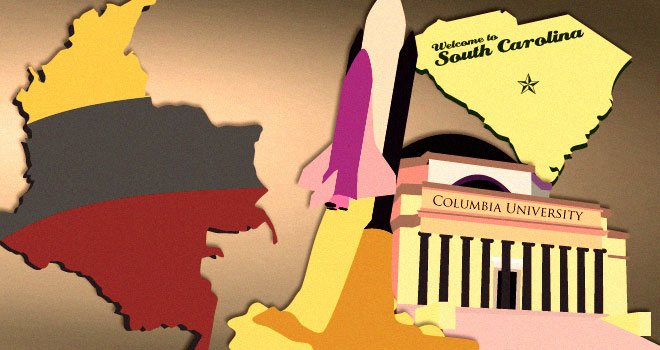One might think that 200 years since its independence as a nation, the spelling record would be set straight. Yet far too often, confusion persists on how to spell the name of a South American country: Colombia.
That’s Colombia with an ‘O’. Not Columbia, with a ‘U’.
We are geographically far from British Columbia and a shuttle age that endured many missions after the ‘Columbia’ disintegrated over Texas in 2003. Yet many still get it wrong. There are no Rocky Mountains in Colombia. We are in the Andes.
The spelling confusion could be justified if one has never traveled to South America or one’s knowledge of the world has been stunted by a lack of education. Even us journalists get it wrong. But that’s no excuse.
We can rely on Google Earth these days to see where Guyana is in relation to French Guiana, and Ghana in relation to Guinea-Bissau.
We can rely on Google Earth these days to see where Guyana is in relation to French Guiana, and Ghana in relation to Guinea-Bissau. Or vice versa. But if you are an editor at a major news group and you are covering a peace process in ‘Columbia,’ you are lost in a linguistic and cultural forest.
At one point in its long history, Colombia was part of ‘La Gran Colombia’ a region which today includes Panama, Venezuela and Ecuador. After liberating these countries from Spain during his military campaigns in the early 1800s, Simon Bolivar knew the importance of ‘what’s in a name’. He had defeated his colonial masters in the “Land of Colon” (Tierra de Colon), named after the Genovese seafarer Christopher Columbus.
And even wiki-historians get some of these facts wrong. Columbus was Italian, not Spanish. He was commissioned by the Royals of Castile to bring back spices from the Far East and found himself sailing towards the Americas. This was three centuries before Bolivar’s campaign of independence for inhabitants of the ‘New Granada.’
The word ‘Colombia’ appears in an early newspaper – ‘Colombiano’ – published by General Francisco de Miranda (1750-1816), one of Bolivar’s close ideological allies and the military commander who would enlist the support of the British to free his native country, Venezuela, from Spanish rule. He was a Tocqueville of sorts, dreaming of a united continent, which would extend from the warm shores of the Caribbean to the frozen plateaus of the Patagonia.
His vision endured only on paper. After his army deserted him, he was captured by his Old World enemies and sent to languish in a Spanish prison. He died in 1816.
For historians, the origin of ‘Colombia’ is rooted with the name Columbus. Maybe therein lies the confusion. Columbus is the Anglicized name of Colón. But centuries after the spice race, I still get emails asking if I am “living in Columbia.”
I generally respond with an ‘O’ and a ‘yes,’ although its been many years since I’ve been to Vancouver, or visited the famous New York university.
So let’s set the record straight, once and for all.
‘Colombia’ is the name of a country with 45 million inhabitants. It has a yellow, blue and red striped flag. The natives generally are a friendly lot, who work hard for a living. They have contributed much to the world of science, sport and art.
And they will continue to do so, even if they are often geographically misplaced by one vowel.

